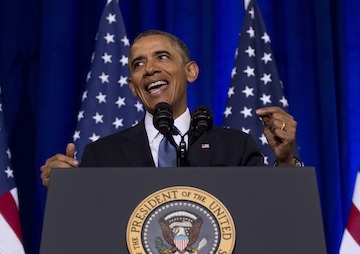Obama Backs NSA, Fails to Demand End to Bulk Data Collection
President Obama outlined what he called "concrete and substantial reforms" of global and domestic U.S. government surveillance Friday, but did not address such key issues as the NSA's sabotage and undermining of global encryption standards. “What I did not do is stop these programs wholesale, not only because I felt that they made us more secure, but also because nothing in that initial review, and nothing that I have learned since, indicated that our intelligence community has sought to violate the law or is cavalier about the civil liberties of their fellow citizens,” Obama said Friday morning. AP Photo/Carolyn Kaster
“What I did not do is stop these programs wholesale, not only because I felt that they made us more secure, but also because nothing in that initial review, and nothing that I have learned since, indicated that our intelligence community has sought to violate the law or is cavalier about the civil liberties of their fellow citizens,” Obama said Friday morning. AP Photo/Carolyn Kaster
President Obama outlined what he called “concrete and substantial reforms” of global and domestic U.S. government surveillance Friday, but did not address such key issues as the NSA’s sabotage and undermining of global encryption standards.
The Guardian summarized:
• One reform appeared to take effect immediately. Analysts searching the database of domestic US phone data will now be restricted to investigating two “hops” from a suspect number, instead of three.
• A second reform, requiring a judicial order for analysts to search the domestic phone database, appeared to be in process. ” Obama said he had directed the attorney general “to work with the [Fisa court] so that during this transition period, the database can be queried only after a judicial finding, or in a true emergency.”
• Obama listed five main areas for reform. 1) new rules for use of signals intelligence collected overseas; 2) review and possible declassification of Fisa court opinions, and the creation by Congress of a “panel of advocates from outside government” to participate in the court; 3) new rules for the storage and use of information on US citizens collected “incidentally”; 4) greater transparency for national security letters; 5) reform of the bulk domestic phone records collection program.
• Congress will have to play a role in the reform of surveillance operations, the president acknowledged. In some cases, he said, Congress may go farther then the reforms he outlined, such as by requiring a court order for the issuance of national security letters or reforming the Fisa court.
… • The president presented the actions of Edward Snowden as coinciding with his own long evolution of thinking on government surveillance. A debate employing “crude characterizations” has played out after “sensational” coverage of the Snowden revelations, Obama said.
Obama began the speech by saying that metadata — information generated about an individual’s use of technology, such as place and time of call — is not data, which refers to the content of a message or activity. That statement contradicts a comment made Tuesday by former CIA acting director Michael Morell: “There is not in my mind a sharp distinction between metadata and content.”
The paper elsewhere reported:
In his widely anticipated address at the Justice Department on the future course of US surveillance policy, Obama said the government should no longer hold databases of every call record made in the United States, citing the “potential for abuse” as the reason for making the change.
But Obama did not make a decision on what ought to replace that database, effectively rejecting a call from civil libertarians to require the NSA to collect subscriber information from phone companies only when they possess specific suspicion of connection to a terrorist group or other wrongdoing.
— Posted by Alexander Reed Kelly.
Your support matters…Independent journalism is under threat and overshadowed by heavily funded mainstream media.
You can help level the playing field. Become a member.
Your tax-deductible contribution keeps us digging beneath the headlines to give you thought-provoking, investigative reporting and analysis that unearths what's really happening- without compromise.
Give today to support our courageous, independent journalists.






You need to be a supporter to comment.
There are currently no responses to this article.
Be the first to respond.